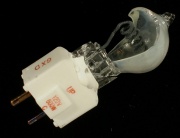Difference between revisions of "Lightbulb filament"
Jump to navigation
Jump to search
| Line 2: | Line 2: | ||
== Description == | == Description == | ||
| − | [[Incandescent lamp|Incandescent]] light bulbs used electricity to heat a metal wire, called a filament, to produce visible light. See attached image. The filament is housed in a sealed, oxygen-free chamber to prevent combustion. Tungsten was used because it has a very high melting point. these bulbs were inexpensive and easy-to-use, but eventually gave way to other, more energy efficient technologies, such as [[Fluorescent lamp|fluorescent]], then [[LED]] lamps. | + | [[Incandescent lamp|Incandescent]] light bulbs used electricity to heat a metal wire, called a filament, to produce visible light. See attached image. The filament is housed in a sealed, oxygen-free chamber to prevent combustion. Tungsten was used because it has a very high melting point. these bulbs were inexpensive and easy-to-use, but eventually gave way to other, more energy efficient technologies, such as [[Fluorescent lamp|fluorescent]], then [[light emitting diode|LED]] lamps. |
== Synonyms and Related Terms == | == Synonyms and Related Terms == | ||
Revision as of 14:02, 7 October 2022
Description
Incandescent light bulbs used electricity to heat a metal wire, called a filament, to produce visible light. See attached image. The filament is housed in a sealed, oxygen-free chamber to prevent combustion. Tungsten was used because it has a very high melting point. these bulbs were inexpensive and easy-to-use, but eventually gave way to other, more energy efficient technologies, such as fluorescent, then LED lamps.
Synonyms and Related Terms
lightbulb filament
